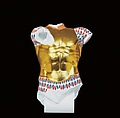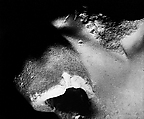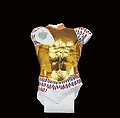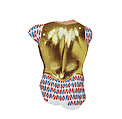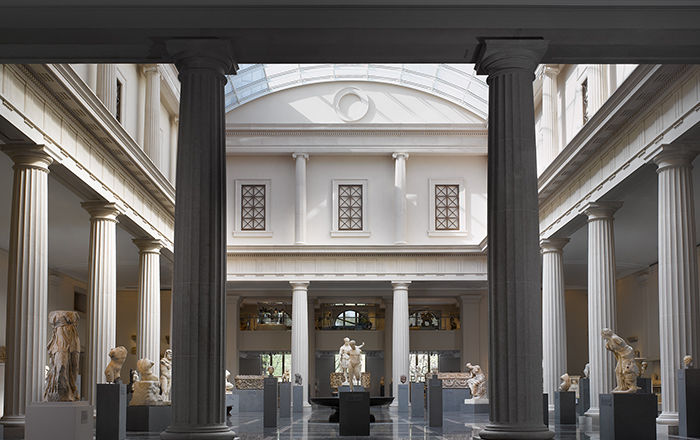Returned to lender The Met accepts temporary loans of art both for short-term exhibitions and for long-term display in its galleries.
Reconstruction of the so-called Cuirass-Torso from the Athenian Acropolis, Variant B
Vinzenz Brinkmann German
Ulrike Koch-Brinkmann
Not on view
The Classical Greek torso reconstructed here was sculpted from marble as if it were nude, with only the lower edge of a cuirass (close-fitting armor) indicated. The painter completed the composition by adding a fine garment worn under the armor and painted on the naked skin at the hips and shoulders. Traces of the pattern—rows of leaves connected by small spirals—are still visible on the original in raking light. This variant is one of three created by the Brinkmann team. It gives the cuirass a golden tone and colors the decorative pattern of the garment in blue and red.
"This marble statue of a torso wearing a cuirass (a piece of armor comprising a breastplate and backplate) stood in the Sanctuary of Athena on the Athenian Acropolis. Two holes on the back below the left shoulder may have once held a sculpted quiver, indicating that the figure represents an archer. In Antiquity cuirasses were modelled in metal, in order to fit exactly the proportions of the warrior's body. The sculptor of the so-called Cuirassed Torso shaped the body as if the figure were nude. Only the lower edge of the cuirass is slightly raised. But the sculptor completely ignored the undergarment, or chitoniskos. Instead, it was the painter who completed what the sculptor left out. Although no pigments are preserved on the original, in ultraviolet and raking light, traces of the patterned decoration of the garment are visible. Suspended and upright leaves are attached to one another by small spirals. This delicate ornament completely covers the chitoniskos and enhances the plasticity of the figure.
Traces of weathering confirm that a variety of colors were used. Two reconstructions show different possible color schemes for the cuirass and the pattern on the chitoniskos: Variant B represents a metal cuirass, while Variant C depicts a leather one."
Vinzenz Brinkmann and Ulrike Koch-Brinkmann
Reconstruction, Variant B, 2005:
plaster cast and natural pigments using the Michael Price method in egg tempera, gold leaf
H. ca. 62 cm.
Gilding and the application of color: Sylvia Kellner, Miguel Gonzalez, Harald Theiss
Liebieghaus Skulpturensammlung (Liebieghaus Polychromy Research Project), Frankfurt am Main, inv. St.P 686
Scientific methods employed:
Ultraviolet-induced visible luminescence imaging (UVL) (Schott KV 418)
Ultraviolet-reflected imaging (UVR) (Schott UG1 or Schott BG12)
Optical stereoscopic microscopy (10–50x, Zeiss and Olympus)
Raking light imaging (Schott KL1500)
Black and white imaging in visible light (VIS)
Color imaging in visible light (VIS)
Photomicrograph (with microscope or macro objectives)
Scientific evaluation:
Vinzenz Brinkmann, Ulrike Koch-Brinkmann
Pigments used in the reconstruction:
blue: Egyptian blue; red: red ocher, calcite; flesh tones: rose madder, calcite.
Acknowledgements:
Christina Vlassopoulou, Athens
Acropolis Museum, Athens
Due to rights restrictions, this image cannot be enlarged, viewed at full screen, or downloaded.
This artwork is meant to be viewed from right to left. Scroll left to view more.
